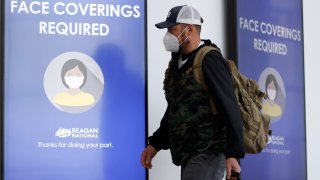
- A group of scientists, including former advisors to President Joe Biden, is urging the CDC to update its guidance to address the risk of airborne spread of the coronavirus.
- The group called on the CDC to mandate N95 masks in high-risk workplaces, such as prisons and meatpacking plants.
- The scientists also urged OSHA to issue emergency workplace standards that require enhanced ventilation in certain settings.
More than a dozen top scientists are pushing the Biden administration to require N95 air filtration masks for employees in risky workplaces such as meatpacking plants and prisons.
The 13 scientists, including several who advised President Joe Biden on the pandemic during the transition, called on the administration to acknowledge that the virus is more airborne than previously thought, especially with the rise of more contagious variants. The highly effective masks filter out about 95% of all small particles.
The group, which includes David Michaels, an epidemiologist at George Washington University who led the Occupational Safety and Health Administration under President Barack Obama, also called on OSHA to issue new standards that require enhanced ventilation in high-risk workplaces.
"CDC guidance and recommendations do not include the control measures necessary for protecting the public and workers from inhalation exposure to SARS-CoV-2," the authors wrote in a letter sent Monday to White House Covid-19 response coordinator Jeff Zients. The letter was also sent to Dr. Rochelle Walensky, director of the Centers for Disease Control and Prevention, and Dr. Anthony Fauci, the White House's chief medical advisor.
"The failure to address inhalation exposure to SARS-CoV-2 continues to put workers and the public at serious risk of infection," the authors continued. "People of color, many of whom work on the front lines in essential jobs, have suffered — and continue to suffer — the greatest impacts of the COVID-19 pandemic."
Federal and international health agencies, including the World Health Organization, have been slow to acknowledge evidence that shows the coronavirus can spread efficiently through the air. It was not until the summer that the WHO acknowledged that airborne spread could not be ruled out, only after more than 200 scientists called on the agency to do so.
Money Report
The CDC, for its part, has appeared in recent weeks to move toward acknowledging the importance of prevention measures targeting airborne spread, such as tighter-fitting masks for the public. On Friday, the CDC issued new school reopening guidance but only touched on the importance of ventilation, saying schools should open windows and doors when possible. Some doctors said it should have emphasized the importance of portable air filters or enhanced HVAC systems in schools.
In the letter sent Monday, the group of scientists outlined the evidence of airborne spread of the virus and pointed to other countries such as Germany and France that have mandated higher quality masks for workers and recommended enhanced indoor ventilation. They said the current guidance from the CDC and other agencies is "out of date" and needs to be urgently updated due to the threat of new, more infectious variants.
CDC spokesman Jason McDonald said in a statement that the agency stands by its current masking recommendations. However, he acknowledged that "there is evidence that we have room for improvement."
He said well-fitting surgical or cloth masks are adequate for general use and that the CDC is working "to increase adoption of masking, ensure that masks are used consistently and correctly, and that when worn masks fit well to the face."
"For reasons supported by science, comfort, costs, and practicality, CDC does not recommend the use of N95 respirators for protection against COVID-19 by the general public," he said. McDonald didn't address whether N95 masks should be worn in high-risk workplaces where there have been documented outbreaks, such as meatpacking plants.
The scientists said the CDC and OSHA should mandate the use of N95 masks in risky workplaces. Currently, they said, the CDC recommends less-effective surgical masks for most health-care workers due to shortages of N95 masks. But the scientists said there's now increased supply of N95 masks and it's time for CDC and OSHA to mandate their use in risky settings where workers could be exposed to coronavirus aerosols.
On his first full day in office, Biden directed OSHA to issue emergency standards for Covid-19, which would include rules around ventilation and masks, by March 15.
"Stronger protective measures are needed immediately to limit exposure and transmission of the SARS-CoV-2 virus to control and end the COVID-19 pandemic," the scientists wrote to the administration. "Action is needed to better protect workers and the public against inhalation exposure to the virus."






